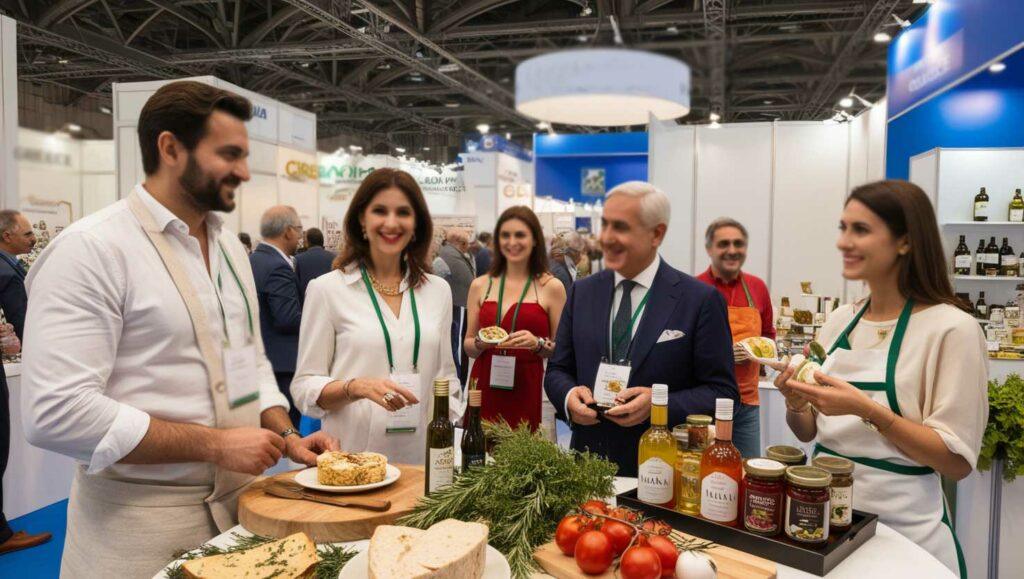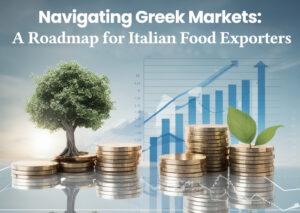Italy and Greece share a rich cultural and historical connection, rooted in their mutual Mediterranean heritage. Over the years, this bond has extended beyond traditions and into vibrant trade relations. Italian products, particularly in the food and beverage sector, are increasingly sought after in Greece, a nation that values quality, authenticity, and culinary excellence.
With an expanding Greek market and rising demand for premium imports, Italian exporters have a unique opportunity to deepen their footprint in this thriving landscape. This article delves into the reasons behind the growing demand, the strategies to maximize export potential, and the pivotal role of upcoming trade events like the Italian food and beverage exhibition in Greece.
The Greek Market: A Growing Opportunity
- Economic Recovery and Consumer Confidence
After weathering a prolonged economic downturn, Greece has entered a phase of recovery and growth. Increased consumer confidence has spurred spending on high-quality and premium goods. Italian products, synonymous with luxury and refinement, have naturally benefited from this trend. - A Rising Tourism Industry
Tourism remains a cornerstone of the Greek economy, with over 27 million visitors annually. Italian food and beverages, from fine wines to artisanal cheeses, have become staples in the hospitality industry. Tourists seek familiar, premium-quality products, making Italian goods a favorite in resorts, restaurants, and local markets. - Mediterranean Cuisine’s Global Appeal
Greek consumers, like their Italian counterparts, cherish the Mediterranean diet. Italian products such as olive oil, pasta, and cured meats align with Greek culinary preferences, making them a natural fit in local households.
Why Italian Products Thrive in Greece
Italian goods have carved a niche in the Greek market due to their unmatched quality, authenticity, and versatility. Key factors driving their success include:
- Strong Culinary and Cultural Parallels
The similarities in Italian and Greek cuisines create a seamless market entry point. Greek consumers resonate with Italian flavors, making products like Parmigiano-Reggiano, Prosciutto di Parma, and Chianti wine household names. - Premium Positioning
Italian exports are often associated with exclusivity and luxury. Products bearing DOP (Protected Designation of Origin) or IGP (Protected Geographical Indication) certifications assure Greek consumers of their authenticity and superior quality. - Trust and Reputation
Italy’s long-standing reputation as a producer of fine goods strengthens consumer trust. Greek buyers, whether individuals or businesses, perceive Italian products as reliable and worth the investment.
Challenges in the Greek Market
While opportunities abound, entering and succeeding in the Greek market requires navigating certain challenges:
- Competition from Local and Global Brands
Greece has a strong domestic food industry, with local products like feta cheese and olive oil dominating the market. Italian exporters must differentiate their offerings and highlight their unique value. - Regulatory Hurdles
Compliance with EU standards and Greek import regulations can be intricate, particularly for first-time exporters. Understanding labeling requirements, tariffs, and certification processes is essential. - Price Sensitivity
While demand for premium goods is rising, price remains a critical factor for many Greek consumers. Italian exporters must balance quality with competitive pricing.
Leveraging Trade Events for Success
The upcoming Italian food and beverage exhibition in Greece is a golden opportunity for Italian exporters to capitalize on the growing demand. This event offers a platform to showcase products, connect with key stakeholders, and gain valuable market insights.
- Showcasing Heritage and Innovation
Italian exhibitors can highlight the unique aspects of their products, from traditional artisanal techniques to modern innovations. Storytelling through visuals and demonstrations can enhance consumer engagement. - Networking with Industry Leaders
The exhibition attracts Greek distributors, retailers, restaurateurs, and hospitality professionals. Establishing relationships with these stakeholders can pave the way for long-term partnerships. - Understanding Consumer Preferences
Direct interaction with Greek consumers provides invaluable feedback. Exhibitors can use this information to tailor their products and marketing strategies to local tastes.
Strategies for Italian Exporters
To make the most of the growing Greek market, Italian businesses should adopt a strategic approach:
- Market Research and Localization
- Conduct in-depth studies to understand Greek consumer behavior.
- Adapt packaging, marketing, and even recipes to align with local preferences.
- Digital Presence
- Utilize social media platforms to build brand awareness among Greek audiences.
- Collaborate with local influencers to showcase the versatility and quality of Italian products.
- Collaborations with Greek Brands
- Partnering with established Greek businesses can help Italian exporters penetrate the market more effectively. Co-branding initiatives can also foster mutual growth.
- Leveraging Certifications
- Emphasize certifications like DOP and organic labels to build trust and highlight the authenticity of Italian products.
The Greek market represents a promising frontier for Italian exports, particularly in the food and beverage sector. With a shared Mediterranean heritage, rising consumer demand for premium products, and a vibrant tourism industry, the opportunities are vast. By leveraging trade events like the Italian food and beverage exhibition, conducting thorough market research, and building strong local partnerships, Italian businesses can unlock their full export potential in Greece.
For exhibitors, the upcoming event is more than a showcase; it is a gateway to forging lasting relationships and expanding their footprint in a market that values quality, authenticity, and tradition. Now is the time for Italian exporters to seize this opportunity and write a new chapter in their Mediterranean success story.






